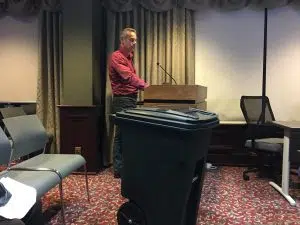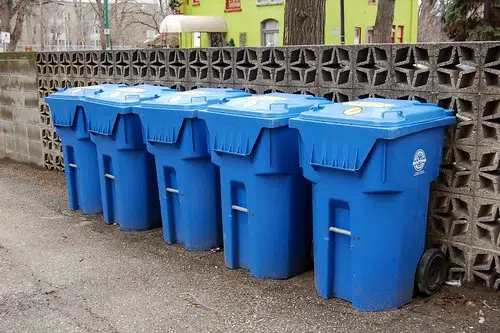Saint John councillors have mixed views about plans to modernize the city’s solid waste collection service.
City staff gave a presentation about the planned changes during last Monday’s council meeting.
Each household will get a 180-litre wheeled garbage bin, which holds about two bags. Residents will have to buy a $2 “bag tag” for each bag that does not fit in the bin.
The city will also roll out curbside recycling and give residents two 80-litre totes — one for paper and cardboard, the other for plastic and metal.
Jeff Hussey, the city’s deputy commissioner of transportation and environment services, said one of the goals is to reduce the amount of trash going to the landfill.
“Currently, the city is at about 21 per cent waste diversion,” said Hussey. “The city’s target would be 50 per cent.”
Numbers presented to council show staff collect an average of 3.71 bags per stop on biweekly routes and 2.64 bags per stop on weekly routes.

One of the new wheeled garbage bins sits in front of Jeff Hussey, Saint John’s deputy commissioner of transportation and environment services, as he gives a presentation to council on October 7, 2019. (Photo: Brad Perry)
Coun. Ray Strowbridge said he cannot support an “extra tax” on city residents when there are no plans to expand weekly pickup across the city.
“If we were gonna, say go to weekly pick-up city-wide, then yeah, I’d say absolutely because you’ve got a couple of bags a week,” said Strowbridge. “But we’re not gonna increase the level of service.”
Currently, only households in the city’s old north end, lower west and south central peninsula receive weekly garbage collection.
Coun. David Merrithew said he is in favour of the program but is worried the fee will lead to dumping.
“I’m afraid of folks just getting their back up against the wall and saying ‘I’m not paying $1, $2 for a bag tag fee,’ and that we’ll see refuse across the city,” said Merrithew.
Hussey said he thinks most citizens will do the right thing, but they will deal with those who do not through bylaw enforcement.
Coun. John MacKenzie said he sees the new program as a great tool to increase recycling in the city.
“For me, it’s something that we don’t have a real choice in doing,” said MacKenzie. “The climate change that we’re seeing right now, we have to take every opportunity we can to make things better.”
The program will be rolled out to about 1,000 households as part of a pilot project in early 2020. Staff will collect data and share the results with council before implementing it across the city.
Hussey said the program will cost $2.2 million to implement. They expect to bring in about $550,000 a year through the bag tags and save about $350,000 annually on tipping fees.








